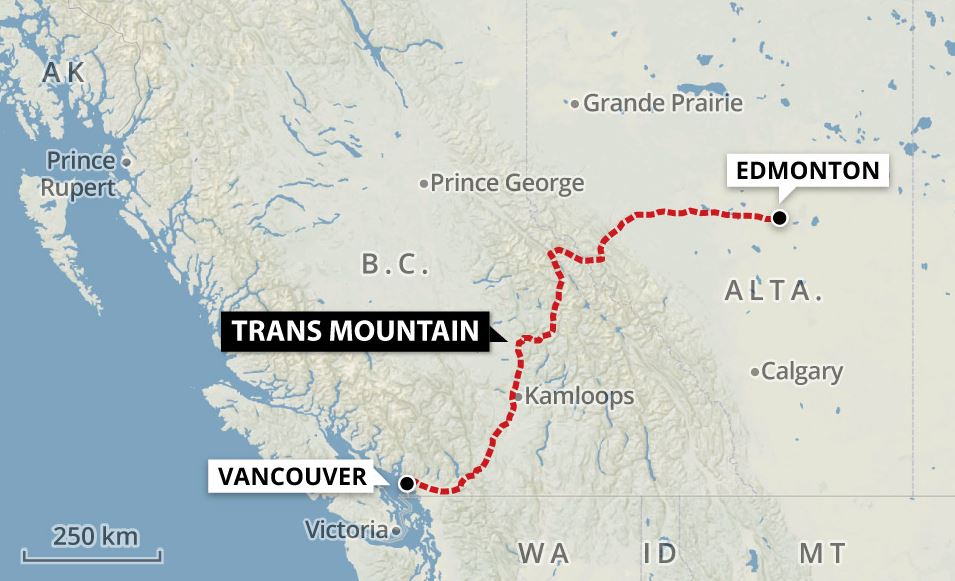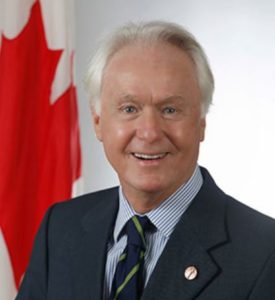Is Canada becoming a graveyard for major resource projects?

By Peter Kennedy
Kinder Morgan Canada’s [KML-TSX] stalled Trans Mountain pipeline twinning expansion has become a symbol of Canada’s inability to get major resource projects completed, says Senator Doug Black.

It is a key reason why the Alberta-based senator introduced Bill S-245 the Trans Mountain Pipeline Project Act in the Senate on February 15, 2018. The aim is to declare that the pipeline expansion project is in the national interest and should proceed for that reason.
Not having access to energy markets is costing Canada billions of dollars and the expansion of the Trans Mountain pipeline system between Edmonton, and Burnaby, B.C. (on tidewater), is a critical solution to this problem, he said.
That was because it was proposed in requests from oil companies to help them reach new markets by expanding the capacity of North America’s only pipeline with access to the West Coast.
However, the expansion continues to face political hurdles after British Columbia’s NDP government served notice that it would temporarily ban expanded shipments of bitumen on the Trans Mountain pipeline. The move prompted the Alberta government to retaliate by banning wine imports from B.C.
What follows is an interview with Senator Black. He spoke to Resource World just hours after the Bill S-245 the Trans Mountain Pipeline Project Act was tabled in the Canadian Senate.
Resource World: Now that Bill S-245 has been tabled, can you describe the process that lies ahead?
Senator Doug Black: The bill has been tabled in the Senate. There will be a debate in the Senate. It will either pass in the Senate or it won’t. I assume it will. Then it goes to the House of Commons where it will also be up for debate. If the bill passes it becomes the law of the land. If it doesn’t pass, the status quo remains in effect.
RW: Why is it in the national interest to see the Trans Mountain built?
DB: Statistics show it is in the national interest. Alberta is the number one beneficiary because of royalties. Ontario, B.C. and Quebec also benefit because of the groundwork and manufacturing necessary to build the pipeline. The Oilsands create thousands of jobs, pipeline construction creates thousands of jobs, and millions and millions of dollars will spin off in revenue and taxation. If we plan to do all the things that we want to do in Canada like building bridges, schools, hospitals, prisons, fund reconciliation with First Nations and pay for peace keeping efforts, we need the money from taxation and royalties.
This is in our interest. Inward investment into Canada is frozen. We cannot build a nation that either Canadians don’t invest in or others don’t invest in. Trans Mountain has become a symbol of our complete inability to get things done in the face of legitimate authority.
RW: Have you any idea just how much money is Canada losing every day because we can only sell petroleum products to the U.S.?
DB: It is about $27 barrel on product that is sold to the U.S. It varies from day to day. We are sending raw product to the U.S. at a discount. They are refining that product and selling it back to Canada. In Atlantic Canada and Quebec, we are importing oil at world price from Venezuela, from Saudi Arabia, Libya, countries with a poor record when comes to human rights and the environment. We are selling our oil at a discount to the U.S. because we can’t get it to Quebec and Atlantic Canada. What do you think the energy leaders of the world are saying?
RW: Have studies proved to the federal government that products from the Kinder Morgan pipeline can be safely transported both on land and on the ocean?
DB: That is clearly what the National Energy Board (NEB) says. This project has been rigorously reviewed by the National Energy Board after an exhaustive hearing process and a thorough review of facts. They have studied it exhaustively. I have high confidence in the National Energy Board. I have worked with them for decades. Give the government of Canada credit; it understands that there is a balance that needs to be achieved. The Canadian Government is endeavouring to achieve it.
RW: Are you familiar with the emergency response facilities that Kinder Morgan is building along the BC coast? Can you comment on that?
DB: Two years ago, I visited the Kinder Morgan end point in Burnaby. I also visited the spill response folks and pilot authority in Vancouver Harbour. They are of the belief that they can manage any issues. They convinced me that they could. There have basically been no issues.
RW: Besides the BC NDP government, what about the objections of municipalities such as Burnaby that don’t want the pipeline?
DB: I say to Burnaby that pipelines are the safest way in the world to transport oil or gas. The safety record is 99%. Every year the technology improves to the point where it is quite sophisticated now. They now have the ability to monitor inside a pipeline to spot weaknesses and cracks. Burnaby, like every other community in Canada, depends on energy, whether it is for heating homes, whether it is for cars or for airplanes, or even for toothbrushes. We depend on energy. It is just a fact. The energy that supports Vancouver comes from Alberta.
That coast is our coast too. You don’t have a monopoly on the coast of British Columbia, any more than I have a monopoly on the Rocky Mountains, or Nova Scotians have a monopoly on Peggy’s Cove. This is our country and I care as much about the coast of British Columbia as folks living in Burnaby do. I am satisfied, and the National Energy Board, the Canadian Environmental Assessment Agency are satisfied that we can manage this. There are thousands of tankers plying the oceans of the world today, going into Rotterdam, Singapore and London without incident. So I am challenging folks in Burnaby to look beyond their back yard, and consider the interests of Canada.
RW: Could you comment on the “trade war” between BC and Alberta that now involves BC wine?
DB: It is just so completely unfortunate. I am Chairman of the Banking Trade and Commerce Committee of the Senate, which has just completed a study on the barriers within Canada to interprovincial trade. It is estimated by officials that the cost to Canada is about $37 billion per year. That is just because we have these stupid little trade spats between provinces, including the beer war in Alberta, a spat over license plates in Saskatchewan, and now a wine feud involving B.C. and Alberta. It is petty and it does not achieve results. Frankly, it is embarrassing that a G7 nation cannot trade amongst [its own] provinces and have this kind of dispute with no way to resolve it. It is not acceptable. Meanwhile, the rest of the world steams on and we are caught in some la la land of our own making, while our competitiveness is being shattered.
RW: Do you think that the dispute over the Trans Mountain pipeline will ultimately wind up in the court? Is that the only way that this is going to get resolved?
DB: I think at the end of the day that is likely right. Likely what could happen is that the Government of Canada will refer bill that I introduced in the Senate on February 15, 2018 to the Supreme Court of Canada for a decision. That is a political decision that the government would have to take. I think the Supreme Court of Canada would deal with it [quickly], because I don’t think the law is very complicated in this case. That will be a decision for the Prime Minister and his team.
RW: How long will it take before this gets resolved and Kinder Morgan can go ahead with construction?
DB: I’m an optimist. So I want to say a short period of time. The shovels could be in the ground within a year. [If this doesn’t happen], we run the risk that Kinder Morgan will say enough already. I think that is something that we should be worried about.
RW: Are you afraid that environmental activists will intervene if this project gets the green light?
DB: You have to expect that there will be incidents of civil disobedience. But this is a country that is built on the rule of law. People are entitled to their point of view. But they are not entitled to disrupt civil society. Laws must be obeyed.
Doug Black Background
Doug Black is an elected senator from Alberta. A resident of Canmore, he is a former energy lawyer and has served in the senate for five years. Black is Chairman of the Senate’s Banking, Trade and Commerce Committee. He is also the founder of the Energy Policy Institute of Canada, which was previously Chaired by former British Columbia M.P. David Emerson and aimed to develop a national energy strategy for Canada.
“I can tell you if we had been successful, we wouldn’t be in the mess that we are in right now.”
